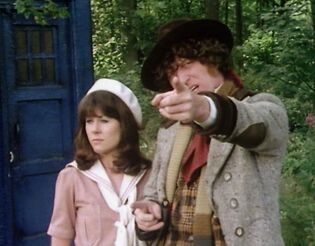Eeny, meeny, miny, moe: Difference between revisions
No edit summary |
No edit summary |
||
| Line 1: | Line 1: | ||
{{first pic|Eeny rhyme.jpg|The [[Fourth Doctor]] uses the rhyme to choose his path. ([[TV]]: ''[[The Android Invasion (TV story)|The Android Invasion]]'')}} | |||
'''Eeny, meeny, miny, moe''' was a traditional children's counting rhyme on [[Earth]], used to select a person to be 'it' for games and similar purposes. | '''Eeny, meeny, miny, moe''' was a traditional children's counting rhyme on [[Earth]], used to select a person to be 'it' for games and similar purposes. | ||
| Line 11: | Line 12: | ||
The opening line was recited by the [[Third Doctor]] to decide which way to go while he and [[Jo Grant]] were making their way through the tunnel leading to the Royal Citadel on [[Peladon]]. ([[TV]]: ''[[The Curse of Peladon (TV story)|The Curse of Peladon]]'') | The opening line was recited by the [[Third Doctor]] to decide which way to go while he and [[Jo Grant]] were making their way through the tunnel leading to the Royal Citadel on [[Peladon]]. ([[TV]]: ''[[The Curse of Peladon (TV story)|The Curse of Peladon]]'') | ||
The [[Fourth Doctor]] recited the opening line to choose the route he and [[Sarah Jane Smith]] should take through [[Devesham Woods|the wood]] they had landed in. Sarah asked him what was "so special about | The [[Fourth Doctor]] recited the opening line to choose the route he and [[Sarah Jane Smith]] should take through [[Devesham Woods|the wood]] they had landed in. Sarah asked him what was "so special about eeny, meeny, miny, moe?" to which he replied that it could just have easily been "fum-fo-fee-fi". Sarah corrected this to "[[fee-fi-fo-fum]]". ([[TV]]: ''[[The Android Invasion (TV story)|The Android Invasion]]'') | ||
The [[Nightmare Man]] recited the original, less offensive, version of the rhyme, which included the word 'tiger' in the second line, whilst deciding whether to invade [[Clyde Langer]] or [[Rani Chandra]]'s dreams first. Rani ended up getting the 'moe'. ([[SJA]]: ''[[The Nightmare Man (TV story)|The Nightmare Man]]''). | The [[Nightmare Man]] recited the original, less offensive, version of the rhyme, which included the word 'tiger' in the second line, whilst deciding whether to invade [[Clyde Langer]] or [[Rani Chandra]]'s dreams first. Rani ended up getting the 'moe'. ([[SJA]]: ''[[The Nightmare Man (TV story)|The Nightmare Man]]''). | ||
Revision as of 14:55, 30 October 2014
Eeny, meeny, miny, moe was a traditional children's counting rhyme on Earth, used to select a person to be 'it' for games and similar purposes.
The most common modern version was:
- Eeny, meeny, miny, moe,
- Catch a tiger by his toe.
- If he hollers, let him go.
- Eeny, meeny, miny, moe.
The King of Hearts recited what would now be considered a politically incorrect version of the rhyme, which included the racial slur 'nigger' in the second line, whilst deciding which of the seven chairs — six of which were deadly, while one remained safe — to choose. (TV: The Celestial Toymaker)
The opening line was recited by the Third Doctor to decide which way to go while he and Jo Grant were making their way through the tunnel leading to the Royal Citadel on Peladon. (TV: The Curse of Peladon)
The Fourth Doctor recited the opening line to choose the route he and Sarah Jane Smith should take through the wood they had landed in. Sarah asked him what was "so special about eeny, meeny, miny, moe?" to which he replied that it could just have easily been "fum-fo-fee-fi". Sarah corrected this to "fee-fi-fo-fum". (TV: The Android Invasion)
The Nightmare Man recited the original, less offensive, version of the rhyme, which included the word 'tiger' in the second line, whilst deciding whether to invade Clyde Langer or Rani Chandra's dreams first. Rani ended up getting the 'moe'. (SJA: The Nightmare Man).
Behind the scenes
The use of the 'n-word' in the King of Hearts' recitation of the rhyme in "The Hall of Dolls" was actually still acceptable at the time of the original 1966 broadcast of The Celestial Toymaker. Although the rhyme is still present on BBC Audio's CD release of the story, to avoid offending modern audiences this section has been obscured by placing part of Peter Purves's narration over the top.

